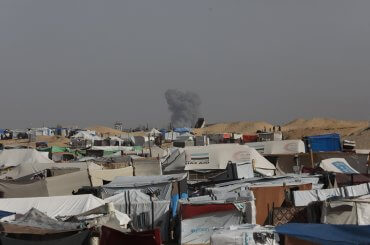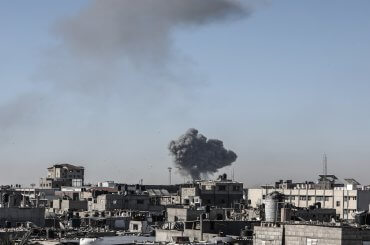Mark Perry writes about Keith Dayton’s role on the Al Jazeera English website:
Despite Dayton’s presumed accomplishments, the forces he has overseen have been accused of being an arm of both the Israeli occupation and an extension of Abbas’ efforts to crush political dissent in the West Bank. Palestinian security forces have been accused of involvement in torture of Hamas officials detained in the sweeps in the West Bank over the last three years. Accounts of torture and abuse of power, of the willful crushing of political dissent and the shuttering of nongovernmental organizationss associated with movements and political parties opposed to PA policies have plagued the Palestinian security services – the Interior Ministry’s special “General Intelligence” (or “GI”) Service, the PG (or “Presidential Guard” – an elite unit guarding Abbas) and Dayton’s National Security Forcres (NSF). The reports are credible – and even admitted to by PA officials who call them regrettable and who vow to stop them.
Despite this, during his tenure, General Dayton consistently denied claims that NSF personnel were engaged in torture, telling the U.S. Senate that he kept a tight grip on NSF activities. Additionally, as a salve to congressional concerns, Dayton established a human rights component in the NSF training curriculum. Even so, reports persist of the summary denial of rights to Palestinians arrested by all Palestinian security services, including the NSF. The most recent and most sobering account of the denial of Palestinian civil rights – and the use of torture – was documented in a December 2010 report issued by The Arab Organization for Human Rights in the UK. As disturbing, Aisling Byrne of Conflicts Forum recentlydetailed the emergence of a police state in the West Bank that rivals any in the Arab world.
Across the board, donors — including the UN — are financing the construction of the infrastructural matrix for the security sector — including prisons (UNDP is funding 52 prisons — “more prisons than schools” a security analyst told me during a recent visit to the West Bank), new security facilities and camps in 8 Palestinian cities (each intelligence agency has its own detention center in each town), an academy and a host of training colleges, security force barracks and other facilities. The principal target for this security infrastructure has been Hamas. Campaigns ostensibly to re-establish public order have provided the cover to clamp down predominantly on Hamas: Palestinian human rights groups have documented over 10,000 supporters of Hamas being arrested by the PA security forces since 2007. The current police/security-to-population ratio in Palestine – 1:80 – is not only one of the highest in the world, but is also financially unsustainable.
These are sobering and controversial claims, but they are true. In a shocking public admission of his goals, General Dayton tied America’s support for the NSF to Abu Mazen’s goal of crushing dissent, bragging about the political campaigns launched by his forces. “Across the West Bank,” he told WINEP, “these security campaigns have featured clamping down on armed gangs … dismantling illegal militias, working against illegal Hamas activities, and focusing on the safety and security of Palestinian citizens.” Has Dayton succeeded? A Hamas legislator puts it best: “The PA has succeeded more than the Israelis in crushing Hamas in the West Bank.”
In spite of Dayton’s “success,” however, there are persistant and nagging reports that his mission has been counterproductive – Palestinian Authority Prime Minister Salam Fayad has distanced himself from Dayton (and on several occasions refused to meet with him). Moreover, it was reliably reported that U.S. special envoy George Mitchell was angered by Dayton’s WINEP speech (and skeptical of Dayton’s role), and the shuttering of NGOs affiliated with Hamas has sparked broad dissent among politically powerful constituencies in the West Bank. These problems were catalogued in an important November 2009 report by the Foundation for Middle East Peace’s Geoffrey Aronson:
Regime protection, the incarceration of Hamas supporters – militants, elected officials, and activists alike – has failed to restore Fateh’s [the political movement led by Abbas] lost luster, blunt Hamas’ popularity or challenge its continued commanding presence in Gaza, or compel Israel to lessen its grip on the West Bank. Indeed the pursuit of Hamas militants as part of a broader rejection of armed resistance against Israel, and more importantly, the associated attack on the Hamas’ popular community network of support and education – the Dawa – has gravely compromised the image of Abbas’ forces as collaborating in Israel’s rule.
The Dayton Mission and The Palestine Papers
The Palestine Papers add appreciable information to our knowledge of the Dayton mission, the National Security Force, Israeli views of the force, the chain of command in the forces, details on their training and equipment and, most importantly, their political and security purposes. The papers provide chilling accounts of the Abbas authority’s concern with “working against illegal Hamas activities” – the emerging police state’s code for suppressing dissent.
Readers will find information on the formation of the NSF and various Palestinian security organizations outlined in a May 10, 2006 meeting between General Dayton and Palestinian chief negotiator Saeb Erekat. A second official document (a letter to Dayton dated May 25), details responsibility for command of the force. The May 10 meeting features Dayton as detailing the U.S. concern that the Palestinians coordinate their security regime with Israel and focus on strengthening a future Palestinian state – “not to fight Hamas.” Readers who spend the time to read in detail the menu of Dayton-related memos will see that, after June 2007, this focus shifts – toward open suppression of Hamas and other political dissidents.
A number of documents provided herein show the obsession of the Palestinian security services with policing the Rafah crossing between Gaza and Egypt and detailing the types of cooperation between the forces and the Israeli military. It’sclear from the documents that the security services are intent to aid the Israelis in policing the smuggling of weapons into Gaza – early evidence that the PA was establishing the force as a weapon in its battle with dissidents to Abbas’ rule. The security situation and the humanitarian crisis in Gaza are an increasing concern to Dayton (his letter of June 1, 2006) in detailing the relationships of the various security forces. Dayton’s letter notes the lack of cooperation of Israel on the Gaza border issue. Even so, Dayton continues to build security force capacity (as outlined in the memo of a meeting held with Saeb Erekat on June 9, 2006).
A key document in The Palestine Papers (a Memorandum to “Dr. Saeb Erekat” of 4 March 2007) outlines the problems Dayton faces with the Congress, notes the role of Saudi Arabia in the internal Palestinian political process, speaks on the problems of the crossings between Gaza and Israel and touches on U.S. concerns with reforms in Fatah. A further memo (dated June 29, 2007) expands on this. The relationship with and cooperation between the security services is the subject of a fascinating exchange on 11 March 2007, and most particularly on July 15, 2007 – when Dayton announces that a full training program has been initiated in Jordan, though problems with the training program (outlined in a meeting of July 24, 2007) remain.
The most important document in the Dayton series is dated March 4, 2008. The paper reviews a meeting between Salam Fayyad, the PA minister of the interior, two other PA officials and Secretary of State Rice, White House official Elliot Abrams, General Dayton – with several others – in attendance. Of importance is Fayyad’s admission – “On Gaza, there was only one winner: Hamas” – and his reiteration that an end to settlement activity is the one key way to ensure the PA’s now teetering legitimacy. The cooperation between the security forces and Israel is noted in a memo dated September 4, 2008, including details of specific Israeli-Palestinian security actions.

